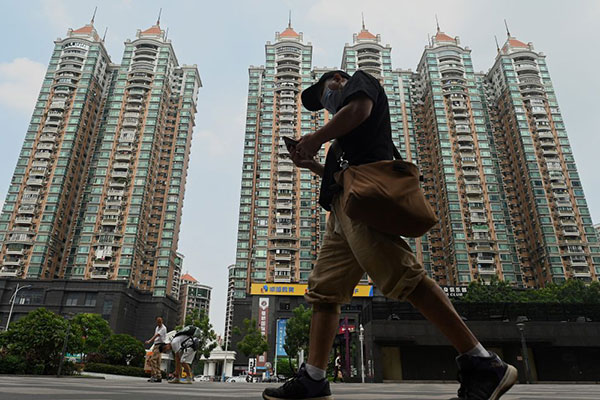Stockwatch: is Evergrande really a write-off?
21st September 2021 11:20
by Edmond Jackson from interactive investor
Our columnist examines the crisis-hit Chinese property giant topping the market news agenda this week.

What substance is there behind China Evergrande Group (SEHK:3333) at the centre of global fears for financial contagion?
Asian equities have set a highly volatile stage for markets today – with the Hong Kong Hang Seng recovering after an initial 1.4% fall but the Tokyo Topix down 1.7% after being closed on Monday.
Around HKD 2.20 today, an all-time low from 31.55 in November 2017, it is capitalised around 29 billion Chinese Yuan or £3 billion equivalent – which is substance to trade, potentially continuing to attract short-selling if allowed.
Western debate polarises between whether the Chinese government will take control of said “property developer” - with foreign investors taking a big haircut on its bonds, so as to ensure domestic smaller investors and home owners are relatively protected.
- Is China’s political risk a bridge too far for investors?
- Read the latest articles by Edmond Jackson here
In such a scenario you can probably write off the equity value: who wants to own part of something controlled by the Communist Party?
But if the government takes a pragmatic line – selective haircuts and debt roll-overs, a managed restructuring where other developers take on Evergrande’s uncompleted projects in exchange for a share of its land bank – then Evergrande 3333 will remain on share dealing pages.
Potentially at least, a chance it becomes a recovery play akin to Greek bonds in that crisis of 2007-08. Although examining it, I see greater parallels with indebted property companies and conglomerates in the late 1980s that proved flaky.
Does this finally trigger a China debt crisis, bears warned of?
As China’s second largest property group by way of revenue, Evergrande has more than 1,300 projects in more than 280 cities – a main line of business is selling flats to relatively affluent citizens.
The context forms a long-time story – whether the Chinese economy can avoid a hard landing, given property development is very significant and operators run high debts. Short sellers such as American Jim Chanos have warned for years, this cannot end well. The likely trigger of a slump would be a banking failure due to the collapse of a major property developer.
Since Covid intervened, all such problems were covered by a colossal tide of monetary and fiscal stimulus – globally. As it eases, Evergrande may be an early example of that old adage, how you next find out who has been swimming without a costume.
Last month, a record number of cases were filed against the group by contractors, became apparent. Also, Chinese developers generally are said to be under repayment pressure on dollar-denominated bonds.
- Ian Cowie: no regrets about selling my China investment trusts
- Subscribe to the ii YouTube channel and catch all our latest interviews and video content
Last week, Evergrande was reportedly unable to pay interest on two loans due for repayment today, and is expected to default. In the event the company failed, some 1.5 million customers would lose their deposits on homes yet to be built.
A key reason the Chinese government is likely to make foreign investors bear more cost, is the “wealth effect” of impacting its own institutions and citizens. Beijing is already pushing domestic listed real estate groups to cut housing costs.
Evergrande is already straining banks and suppliers, and over the last week individuals have been protesting outside its Guangdong headquarters. The government will therefore also be keen to prevent social unrest.
Allegedly, some 3.8 million jobs a year are created by Evergrande, hence hard to imagine China would let it collapse akin to the parallel example of Lehman Brothers in September 2008.

A man walks past a housing complex by Chinese property developer Evergrande in Guangzhou, China. (Photo by Noel Celis /AFP via Getty Images)
‘The world’s most indebted property company’
The global story is Evergrande currently having more than $300 billion equivalent – or £219 billion – liabilities including some $100 billion debt repayment pressure on dollar denominated bonds.
When I study its end-2020 balance sheet however (first-half 2021 results are yet to be published) gearing does not appear so grossly high – for an asset-backed property developer – in an era of very low interest rates.
Note that Chinese companies report in renminbi, which is the official currency, versus the yuan being the unit of account of the financial system.
Net assets were RMB 350.4 billion (£39.7 billion) with RMB 381.1 billion long-term debt and RMB 335.5 billion short term; therefore gearing of 205% or respecting RMB 158.8 billion cash, net gearing of 159%. Moreover, the chairman’s statement targeted a net debt to equity ratio below 100% by last June-end.
- Six things you must do before buying any share
- Take control of your retirement planning with our award-winning, low-cost Self-Invested Personal Pension (SIPP)
While I just recently advocated Tritax EuroBox (LSE:BOXE) with gross gearing of 34% and net of 8%, over decades I have seen property groups geared over 100%. So long as the supporting financial system is sound, also the business model, some might say around 100% gearing is “optimising” the balance sheet for an asset-backed operation.
Evergrande, for example, had RMB 1,258 trillion development properties under end-2020 current assets, and RMB 169 billion investment properties, also scant goodwill.
What stick out for me, in terms of potential strain, are RMB 829 billion trade payables – up 15% on 2019 - versus RMB 142 billion trade receivables, and relative to RMB 507 annual revenue. That suggests a business growing on the back of squeezing suppliers, sub-contractors and the like – but if they were to revolt?
You could also say is symptomatic of over-trading and hardly surprising there are rumours Evergrande cannot pay its bills. But if auditors PWC can be relied on with their declaration of “a true and fair view”, the end-2020 ratio of current assets to current liabilities was 1.26 and there was RMB 159 billion free cash.
Evergrande Group - summary income statements
CNY million
| 2017 | 2018 | 2019 | 2020 | |
| Total Revenue | 311.0 | 466.2 | 477.6 | 507.2 |
| Cost of Revenue | 198.8 | 297.2 | 344.6 | 384.6 |
| Gross Profit | 112.3 | 168.9 | 132.9 | 122.6 |
| Operating Expense | 34.1 | 35.7 | 45.8 | 59.1 |
| Operating Profit | 78.1 | 133.3 | 87.1 | 63.5 |
| Interest Charge | -4.8 | -4.5 | -14.2 | -6.9 |
| Pre-tax Profit | 77.5 | 126.8 | 74.2 | 68.2 |
| Taxation | 40.4 | 60.2 | 40.6 | 36.8 |
| Net profit | 24.4 | 37.4 | 17.3 | 8.1 |
Fast-growing and diversifying
I am also concerned at a culture of rapid growth and diversification, despite perception of Evergrande as a property developer.
Its numbers soared around four-fold in 2017 and the 2020 annual report reminds me of 1980’s conglomerates trying to do many things – also with debt. This contributed to over-stretch and such businesses hitting financial trouble in the early 1990s recession.
The annual report described “a whole industry chain intelligent ecosystem”. Evergrande has completed the transformation from real estate to “diversified industries plus digital technology” and created a diversified industry ecosystem focusing on fixed space and mobile, and formed closed-loop data serving millions of users, linking eight major industry platforms.”
That sounds quite an edifice, if it cannot pay its bills. Doubtless the management would argue it is a modern agenda for the digital economy, in contest of the Chinese economy forecast to grow over 8% this year.
In fairness, a Western perspective may have limitations to interpret Chinese growth by our standards. But that was said of Japan also, until the late 1980s exposed inherent weaknesses – like short sellers more recently have alleged of China.
It makes Evergrande a “moment of truth” for the Chinese economy, with far wider ramifications than one listed stock.
Broadly, avoid the stock for now
There is a scenario where Evergrande becomes a recovery play if Beijing decides, foreign investors should be treated respectfully enough – i.e. do not lose all their money on Evergrande bonds – and does not take full control of the company. China has incentive to do so, for its international economic reputation.
Strictly speaking, I can but assert a “sell” stance given too many red flags to assert “hold”. This can yet, however, turn up from HKD 2.20 if Beijing has its act together, with a wider conscience. Sell.
Edmond Jackson is a freelance contributor and not a direct employee of interactive investor.
These articles are provided for information purposes only. Occasionally, an opinion about whether to buy or sell a specific investment may be provided by third parties. The content is not intended to be a personal recommendation to buy or sell any financial instrument or product, or to adopt any investment strategy as it is not provided based on an assessment of your investing knowledge and experience, your financial situation or your investment objectives. The value of your investments, and the income derived from them, may go down as well as up. You may not get back all the money that you invest. The investments referred to in this article may not be suitable for all investors, and if in doubt, an investor should seek advice from a qualified investment adviser.
Full performance can be found on the company or index summary page on the interactive investor website. Simply click on the company's or index name highlighted in the article.
Disclosure
We use a combination of fundamental and technical analysis in forming our view as to the valuation and prospects of an investment. Where relevant we have set out those particular matters we think are important in the above article, but further detail can be found here.
Please note that our article on this investment should not be considered to be a regular publication.
Details of all recommendations issued by ii during the previous 12-month period can be found here.
ii adheres to a strict code of conduct. Contributors may hold shares or have other interests in companies included in these portfolios, which could create a conflict of interests. Contributors intending to write about any financial instruments in which they have an interest are required to disclose such interest to ii and in the article itself. ii will at all times consider whether such interest impairs the objectivity of the recommendation.
In addition, individuals involved in the production of investment articles are subject to a personal account dealing restriction, which prevents them from placing a transaction in the specified instrument(s) for a period before and for five working days after such publication. This is to avoid personal interests conflicting with the interests of the recipients of those investment articles.